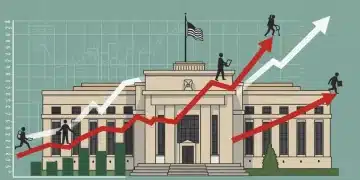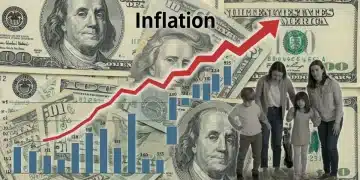Insights on interest rate predictions: what to expect

Anúncios
Interest rate predictions are affected by inflation, employment rates, and central bank policies, influencing borrowing costs and financial planning for individuals and businesses.
Insights on interest rate predictions can shape your understanding of the financial landscape. With rates fluctuating, have you ever wondered how these changes might impact your wallet? Let’s dive into the factors at play.
Anúncios
Understanding current interest rate trends
Understanding current interest rate trends is crucial for anyone navigating the financial landscape. As rates fluctuate, they can significantly impact your borrowing and savings strategies.
Today, many factors contribute to how interest rates are set. For instance, economic conditions, government policies, and market demands all play a role. Knowing how to interpret these trends can help you make better financial decisions.
Anúncios
Key Contributors to Interest Rate Trends
Several elements influence interest rates:
- Inflation impacts borrowing costs; as prices rise, so do interest rates.
- Central bank policies play a significant role. For example, the Federal Reserve adjusts rates to control economic growth.
- Market conditions also affect rates. If more people are seeking loans, lenders may increase rates.
These components constantly interact, creating a dynamic environment for interest rates. In addition, global events can disrupt trends, making the market unpredictable. Awareness of these changes allows you to adjust your strategies accordingly.
Recognizing Patterns in Interest Rates
Analysts often look for patterns to forecast future trends. While historical data provides insight, external factors can quickly change the landscape. Understanding both past and present trends helps gauge potential outcomes.
For example, if rates have been historically low but inflation is rising, one might anticipate an uptick in rates soon. Staying informed about these patterns allows you to prepare effectively.
Factors driving interest rate predictions

Factors driving interest rate predictions are essential to understanding the financial landscape. These elements reveal why rates change and how such shifts affect your financial decisions.
One primary factor is inflation. When inflation rises, central banks may increase interest rates to keep prices stable. This means higher costs for borrowing, which can shape your purchasing power.
Central Bank Policies
The policies set by central banks, like the Federal Reserve, are significant. They adjust rates based on economic conditions. For instance, if the economy is growing too fast, central banks might raise rates to prevent overheating.
- Economic Growth: A strong economy often leads to higher interest rates.
- Unemployment Rates: Low unemployment can drive rates up as consumer spending increases.
- Global Events: Changes in international markets can influence local rates.
Additionally, investor behavior impacts interest rates. When investors seek safer assets, they may prefer government bonds, causing yields to fall. This behavior influences borrowing costs for consumers and businesses alike.
Market Demand and Supply
Supply and demand dynamics also play a role in interest rates. If demand for loans exceeds supply, lenders might increase rates. Conversely, if there are too many loans available, rates may drop.
As you navigate your financial choices, staying updated on these factors can provide clarity. By understanding the influences on interest rates, you can better anticipate changes and prepare for the future.
How interest rates affect your financial choices
How interest rates affect your financial choices is a vital topic for anyone managing their money. These rates can impact loans, savings, and overall financial planning.
When interest rates rise, borrowing becomes more expensive. This change can make a big difference if you’re planning to take out a loan for a car, a home, or education. Higher rates mean higher monthly payments, which can strain your budget.
Impact on Loans
Many people underestimate the effect of interest rates on their loans. For example, if you take out a mortgage when rates are low, your monthly payments will be more manageable. On the other hand, if rates rise after you buy, refinancing could become less appealing.
- Home loans: Higher rates mean larger payments, reducing affordability.
- Personal loans: Higher costs make it harder to manage other expenses.
- Auto loans: A small increase in rates can significantly raise your overall costs.
Conversely, when interest rates are low, you can save more on interest payments. This situation allows you to dedicate more of your income to other financial goals, such as saving for retirement or building an emergency fund.
Influence on Savings and Investments
Interest rates also impact how much you earn on savings. When rates are high, you might earn more on your savings accounts or certificates of deposit (CDs). However, with low rates, your savings may grow slowly, which can make long-term planning challenging.
Additionally, if you’re investing in the stock market, interest rates affect corporate profits, which in turn, influences stock prices. Understanding this connection can help you make smarter investment choices.
Future outlook on interest rates

The future outlook on interest rates is a topic that captures the attention of many. Understanding potential trends can help individuals and businesses plan their financial strategies.
Experts often consider various indicators to forecast where interest rates might head. Economic growth is one of these indicators. When the economy shows signs of strength, it often leads to higher interest rates as central banks act to control inflation.
Economic Indicators to Watch
Several factors will influence the future of interest rates:
- Inflation Rates: If inflation continues to rise, expect central banks to increase interest rates.
- Employment Statistics: High employment can drive consumer spending, pushing rates up.
- Global Economic Conditions: Events outside your country can also play a significant role in interest rate adjustments.
In addition to these economic indicators, political events and policies can affect rates. For instance, new legislation that promotes economic growth may lead to higher interest rates. Conversely, uncertainty in the market may cause rates to stabilize or even drop.
Market Predictions
Financial analysts frequently provide predictions based on current data. However, these forecasts can be subject to change due to unforeseen events. Investors and consumers should stay informed about market developments to adapt their plans accordingly.
Understanding the future outlook on interest rates helps you make better financial choices, whether you are looking to borrow, save, or invest. Staying proactive can put you in a better position as rates evolve.
FAQ – Frequently Asked Questions about Interest Rate Predictions
What factors influence interest rate predictions?
Interest rate predictions are influenced by inflation rates, employment statistics, central bank policies, and global economic conditions.
How do rising interest rates affect loans?
Rising interest rates increase the cost of borrowing, which can lead to higher monthly payments on loans and mortgages.
What should I consider when planning my finances?
Consider staying informed about interest rate trends, inflation, and market conditions, as these factors can impact your financial strategies.
Can I save more when interest rates are high?
Yes, higher interest rates typically lead to better returns on savings accounts and fixed deposits, allowing you to grow your savings faster.





